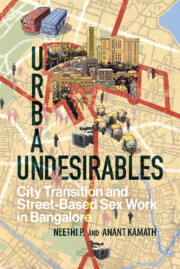6 - Technology
Published online by Cambridge University Press: 30 June 2022
Summary
‘When did you use your first mobile phone for your work?’
‘Much before any of you did for your work.’
This, with its gentle sarcasm, was the manner in which we began conversations with our narrators on the use of the mobile phone in their trade. With a two-decade-long overhaul of the city to befit Citizens and (legitimate) Populations, street-based sex workers, among other pseudo-invisibles, have coped with this divestment of urban workspace and consequent everyday oppression by migrating to digital platforms. Unlike sex workers of higher-economic strata who operate via the internet for motivations that have little to do with disappearing urban spaces and ground-level aggression, our narrators have needed to resort to using the mobile phone and, subsequently, mobile-phone-based internet, to sustain their occupation and their very existence. The pervasive use of mobile phones in sex work or the internet is neither new nor unique to Bangalore. Global trends in sex work have increasingly seen the adoption of mobile phone technologies for operations, support and collectivisation in this sector – that is, a wholesale movement to a digital platform – but what is interesting in our case here is that while the employment of mobile phones was an early development in the sector, dating back to about 2001–2002 (according to our narrators), it became a device for sheer survival only eventually because their traditional worksites had begun to disappear, or gradually became forbidding. In other words, what makes this a novel development in sex work in this particular case is that the technological experience has been intensified as a response to neoliberal urban transition, as much as it has purely for improving efficiency in business.
Naturally, experiences with moving operations to mobile phone platforms have been mixed for these workers. But we must bear in mind that their engagement with mobile phones is not the only exclusive technological experience among street-based sex workers. Our conversations on the phone regularly veered to other technological devices that have graced this city over the last decade, and new actors that have adopted cutting-edge technologies, who have been on the prowl in recent years.
- Type
- Chapter
- Information
- Urban UndesirablesCity Transition and Street-Based Sex Work in Bangalore, pp. 142 - 172Publisher: Cambridge University PressPrint publication year: 2022



